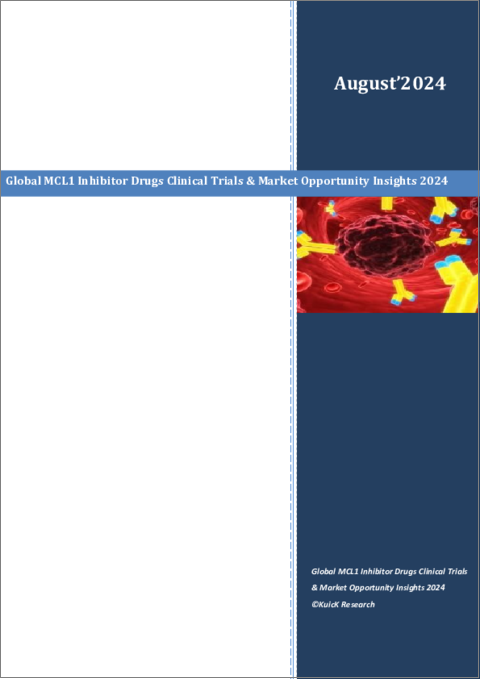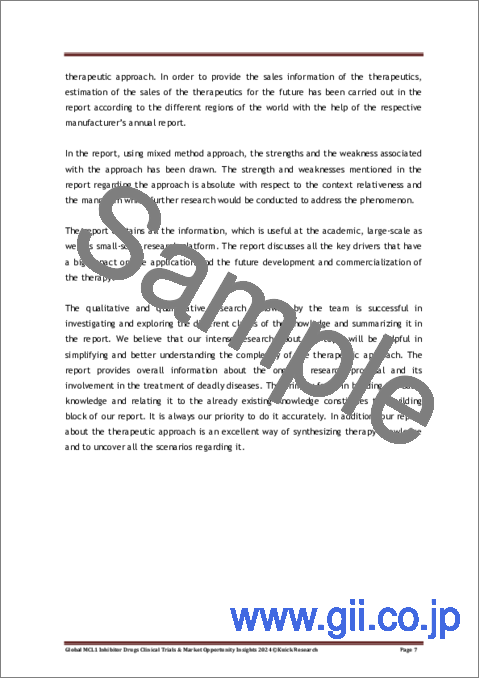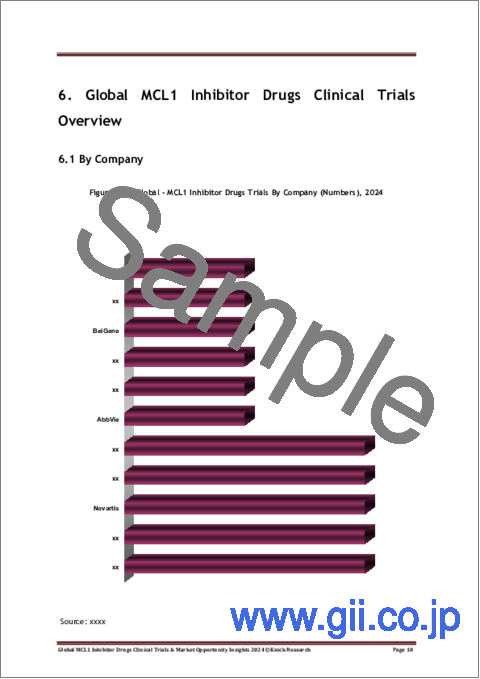|
|
市場調査レポート
商品コード
1539241
MCL1阻害薬市場:臨床試験と商業化の機会(2024年)MCL1 Inhibitor Drug Clinical Trials & Commercialization Opportunity Insights 2024 |
||||||
|
|||||||
| MCL1阻害薬市場:臨床試験と商業化の機会(2024年) |
|
出版日: 2024年08月01日
発行: KuicK Research
ページ情報: 英文 60 Pages
納期: 即日から翌営業日
|
全表示
- 概要
- 図表
- 目次
MCL1阻害剤は、がん治療における有望かつ課題的なフロンティアであり、医薬品開発の新たな機会として大きな可能性を秘めています。承認されたMCL1阻害薬がなく、開発の最高段階が第2相臨床試験であるにもかかわらず、MCL1阻害薬は製薬企業や研究者の大きな関心を集め続けています。この関心は、MCL1ががん細胞の生存に果たす重要な役割と、既存の治療法に対する耐性を克服するターゲットとしての可能性によってもたらされています。
MCL1(myeloid cell leukemia 1)は、B細胞白血病/リンパ腫-2(BCL-2)タンパク質ファミリーに属する重要な抗アポトーシスタンパク質です。このタンパク質は、様々ながん種において細胞の生存とアポトーシスに対する抵抗性を促進するという極めて重要な役割を担っているため、がん治療の魅力的な標的として浮上してきました。MCL1は血液悪性腫瘍や固形がんで頻繁に過剰発現され、がん細胞の生存増殖や従来の治療法に対する抵抗性に寄与しています。このようにがん生物学に広く関与していることから、MCL1阻害は複数のがん適応症に広く応用できる治療戦略としての可能性が強調されます。
MCL1を特異的に標的とする低分子阻害剤の開発は、この分野における主要な焦点です。これらの努力は、MCL1とそのプロアポトーシス結合パートナーとの間の蛋白質間相互作用を破壊し、それによってがん細胞死を誘発することを目的としています。複数の製薬企業や学術機関が、力価、選択性、薬物動態学的特性を改善した低分子MCL1阻害剤の開発と最適化に積極的に取り組んでいます。
MCL1阻害剤の市場開拓は、いくつかの要因によって大きな可能性を秘めています。MCL1過剰発現が観察される多くのがん種にまたがる大きな潜在市場は、複数の適応症にまたがる重要な患者集団を示しています。また、多くのがんが既存の治療法に耐性を示すため、これらの耐性メカニズムを克服できる新規治療オプションに対する需要が生じており、アンメットメディカルニーズも明確です。
MCL1阻害剤は、他の標的治療薬、化学療法、免疫療法との併用が有望であり、その応用の可能性と市場価値を拡大します。特に、最初に上市された化合物が大きな市場シェアを獲得し、この分野で確固たる地位を確立できる可能性があるため、先発品としての優位性は非常に魅力的です。さらに、新規のMCL1阻害剤やMCL1を標的とする革新的なアプローチには、強固な特許保護と独占権を得る機会があります。
当レポートは、世界のMCL1阻害薬市場について調査し、市場の概要とともに、薬剤動向、臨床試験動向、地域別動向、および市場に参入する企業の競合情勢などを提供しています。
目次
第1章 調査手法
第2章 MCL1阻害剤のイントロダクション
第3章 MCL1阻害剤- 作用機序
- MCL1の間接阻害
- MCL1の直接阻害
第4章 MCL1の役割と適応症別の臨床イノベーション
- 造血悪性腫瘍
- 白血病
- リンパ腫
- 多発性骨髄腫
- 固形がん
- 乳がん
- 肺がん
- 悪性黒色腫
- 大腸がん
- ウイルス感染
第5章 世界のMCL1阻害薬市場の機会展望
- 現在の臨床調査の情勢
- 将来の商業化の機会
第6章 世界のMCL1阻害薬の臨床試験の概要
- 企業別
- 国別
- 適応症別
- 患者セグメント別
- 相別
第7章 MCL1阻害剤の臨床試験に関する企業、国、適応症、相別の考察
- 前臨床
- 第I相
- 第I/II相
- 第II相
第8章 競合情勢
- Abbvie
- Amgen
- Anji Pharma
- Ascentage Pharma
- Broad Institute
- Cyclacel Pharmaceuticals
- Gilead Sciences
- Novartis
- Servier
- Sirnaomics
List of Figures
- Figure 4-1: MIK665 Phase I Study (NCT04702425) - Initiation & Completion Year
- Figure 4-2: AZD5991 Phase I/II Study (NCT03013998) - Initiation & Completion Year
- Figure 4-3: GFH009 Phase I/II Study (NCT04588922) - Initiation & Completion Year
- Figure 6-1: Global - MCL1 Inhibitor Drugs Trials By Company (Numbers), 2024
- Figure 6-2: Global - MCL1 Inhibitor Drugs Trials By Country (Numbers), 2024
- Figure 6-3: Global - MCL1 Inhibitor Drugs Trials By Indication (Numbers), 2024
- Figure 6-4: Global - MCL1 Inhibitor Drugs Trials by Patient Segment (Numbers), 2024
- Figure 6-5: Global - MCL1 Inhibitor Drugs Trials By Phase (Numbers), 2024
MCL1 Inhibitor Drug Clinical Trials & Commercialization Opportunity Insights 2024 Report Highlights:
- Research Methodology
- ML1 Inhibitor Drug In Clinical Trials: > 10 Drugs
- MCL1 Inhibitor Drug Clinical Trials Insight By Company, Indication and Phase
- Global MCL1 Inhibitor Drug Market Opportunity Outlook
- Role of MCL1 & Clinical Innovation by Indications
- Competitive Landscape
MCL1 inhibitors represent a promising yet challenging frontier in cancer therapeutics, with significant potential as an emerging opportunity for drug development. Despite the absence of approved MCL1 inhibitors and the highest stage of development being phase 2 clinical trials, the MCL1 inhibitors continues to attract substantial interest from pharmaceutical companies and researchers alike. This interest is driven by the critical role MCL1 plays in cancer cell survival and its potential as a target for overcoming resistance to existing therapies.
MCL1 (myeloid cell leukemia 1) is a critical anti-apoptotic protein belonging to the B-cell leukemia/lymphoma-2 (BCL-2) protein family. It has emerged as an attractive target for cancer therapy due to its pivotal role in promoting cell survival and resistance to apoptosis in various cancer types. MCL1 is frequently overexpressed in hematologic malignancies and solid tumors, contributing to cancer cell survival proliferation, and resistance to conventional therapies. This widespread involvement in cancer biology underscores the potential of MCL1 inhibition as a therapeutic strategy with broad applications across multiple cancer indications.
The development of small molecule inhibitors specifically targeting MCL1 has been a primary focus in this field. These efforts aim to disrupt the protein-protein interactions between MCL1 and its pro-apoptotic binding partners, thereby triggering cancer cell death. Several pharmaceutical companies and academic institutions are actively engaged in developing and optimizing small molecule MCL1 inhibitors with improved potency, selectivity and pharmacokinetic properties.
While direct MCL1 inhibitors are under development, alternative approaches to targeting MCL1 have also gained traction. One such strategy involves the use of cyclin-dependent kinase (CDK) inhibitors, particularly CDK9 or CDK7, which indirectly suppresses MCL1 expression by interfering with its transcription. This approach leverages the short half-life of MCL1 protein, rapidly depleting cellular MCL1 levels and potentially overcoming some of the challenges associated with direct inhibition. An example of this is Cyclacel Pharmaceuticals' Seliciclib, a CDK inhibitor, which also lowers the levels of MCL1 in the cell.
Another avenue being explored is the use of BCL-2 inhibitors that demonstrate activity against MCL1. This primarily involves the development of inhibitors targeting the BH3 binding domain, which is found on both BCL-2 and MCL1. While these compounds may lack the selectivity of dedicated MCL1 inhibitors, they offer the potential advantage of simultaneously targeting multiple anti-apoptotic proteins, potentially leading to more robust anti-cancer effects.
The market opportunity for MCL1 inhibitor development is substantial, driven by several factors. The large potential market, spanning numerous cancer types where MCL1 overexpression is observed, presents a significant patient population across multiple indications. There is also a clear unmet medical need, as many cancers develop resistance to existing therapies, creating a demand for novel treatment options that can overcome these resistance mechanisms.
MCL1 inhibitors show promise in combination with other targeted therapies, chemotherapies, and immunotherapies, expanding their potential applications and market value. The first-to-market advantage is particularly compelling, as the first successful compound to reach the market could capture significant market share and establish a strong position in the field. Additionally, novel MCL1 inhibitors and innovative approaches to MCL1 targeting present opportunities for robust patent protection and exclusivity.
Additionally, emerging research suggests potential applications for MCL1 inhibitors beyond oncology, such as in antiviral treatments, potentially broadening the market scope. This expansion into other therapeutic areas could significant increase the commercial potential of MCL1 inhibitors.
In conclusion, while the development of MCL1 inhibitors faces challenges, including potential off-target toxicities and the need for careful patient selection, the market opportunity remains compelling. The combination of a large potential market, significant unmet medical need, and the possibility of first-mover advantage makes MCL1 inhibition an attractive area for pharmaceutical investment and innovation in the coming years.
Table of Contents
1. Research Methodology
2. Introduction To MCL1 Inhibitors
- 2.1 MCL1 As A Therapeutic Target
- 2.2 Role of MCL1 in Cancer
3. MCL1 Inhibitors - Mechanism of Action
- 3.1 Indirect Inhibition of MCL1
- 3.2 Direct Inhibition of MCL1
4. Role of MCL1 & Clinical Innovation by Indication
- 4.1 Hematological Malignancies
- 4.1.1 Leukemia
- 4.1.2 Lymphoma
- 4.1.3 Multiple Myeloma
- 4.2 Solid Cancers
- 4.2.1 Breast cancer
- 4.2.2 Lung Cancer
- 4.2.3 Melanoma
- 4.2.4 Colorectal cancer
- 4.3 Viral Infections
5. Global MCL1 Inhibitor Drug Market Opportunity Outlook
- 5.1 Current Clinical Research Landscape
- 5.2 Future Commercialization Opportunities
6. Global MCL1 Inhibitor Drugs Clinical Trials Overview
- 6.1 By Company
- 6.2 By Country
- 6.3 By Indication
- 6.4 By Patient Segment
- 6.5 By Phase
7. MCL1 Inhibitors Clinical Trials Insight By Company, Country, Indication & Phase
- 7.1 Preclinical
- 7.2 Phase I
- 7.3 Phase I/II
- 7.4 Phase II
8. Competitive Landscape
- 8.1 Abbvie
- 8.2 Amgen
- 8.3 Anji Pharma
- 8.4 Ascentage Pharma
- 8.5 Broad Institute
- 8.6 Cyclacel Pharmaceuticals
- 8.7 Gilead Sciences
- 8.8 Novartis
- 8.9 Servier
- 8.10 Sirnaomics






